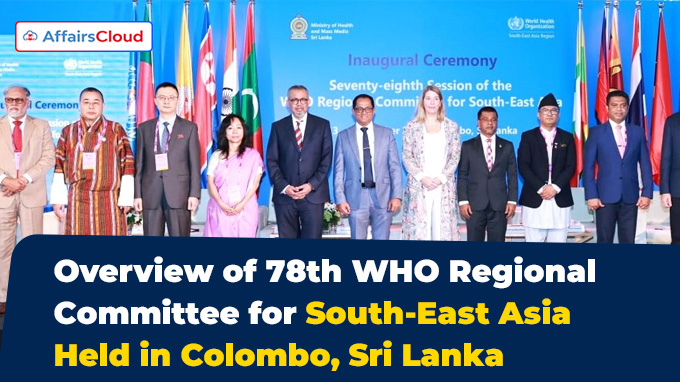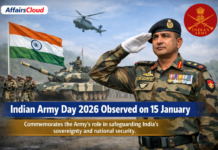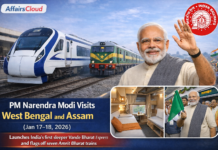The 78th session of World Health Organisation (WHO) Regional Committee (RC78)for South-East Asia was held under the chairmanship of Sri Lanka’s Minister of Health Nalinda Jayatissa, from October 13 to October 15, 2025 in Colombo, Sri Lanka.
- The event brought together health leaders and experts from across the South-East Asia Region (SEAR) to discuss key health priorities.
- The session was inaugurated by Jagath, Wickramaratne, Speaker of the Parliament of Sri Lanka.
Exam Hints:
- Event: 78th session of WHO Regional Committee (RC78)for South-East Asia
- Hosted by: Sri Lanka
- Held in: Colombo, Sri Lanka
- Chairperson of RC-78: Nalinda Jayatissa, Health Minister of Sri Lanka
- Who Represented India? MoS Anupriya Patel, MoH&FW
- Key Highlight: Adoption of Colombo Declaration on ‘Healthy Ageing through strengthened primary health care’
- Winners of Public Health Champions Awards:
- FCHVs Programme (Nepal) for its transformative role in maternal and child health
- LEPRA Society (Hyderabad, Telangana, India) in the field of Neglected Tropical Diseases (NTDs) and disability;
- Dr. Satendra Singh, Director-Professor of Physiology at UCMS and GTB Hospital (from Delhi, India)
About 78th WHO Regional Committee for South-East Asia:
Key Participants: The event was attended by Dr. Tedros Adhanom Ghebreyesus, Director-General (DG) of WHO; Dr. Catharina Boehme, Officer-in-Charge of WHO South East Asia Regional Office (SEARO); health minister and other senior officials from member countries of the region.
India’s Representation: Union Minister of State (MoS) Anupriya Patel, Ministry of Health and Family Welfare (MoH&FW) of Government of India (GoI) represented India at the session, reflecting the country’s active role in advancing regional health cooperation and strengthening collective response mechanism in South and South-East Asia.
Key Priorities: During the 3-day long event, discussions were mainly focused on promoting healthy ageing through stronger primary healthcare, preventing tobacco consumption, expanding the corpus of the South-East Asia Regional Health Emergency Fund (SEARHEF) and accelerating action against Antimicrobial Resistance (AMR).
Adoption of Key Resolutions:
Colombo Declaration:
Overview: During the ministerial round table, the member nations of SEAR unanimously adopted the Colombo Declaration on ‘Healthy Ageing through strengthened primary health care’, aimed at health and well-being of its ageing population, expected to double by 2050.
- This newly adopted declaration calls for the inclusion of healthy ageing in national policies and PHC-oriented health systems, ensuring accessible, equitable, integrated and age-responsive services across the continuum of care, from health promotion and prevention to rehabilitation, long-term care and palliative care.
Aligns with: The Ministerial Declaration aligned closely with the Regional Strategy for Healthy Ageing 2024-2030, which outlines 4 key priority areas i.e. combating ageism, fostering enabling environments, delivering integrated person-centered care, and ensuring access to long-term care.
Resolution on AMR:
Objective: The member states adopted a resolution to combat AMR, aimed to strengthen national health sector and multi-sectoral collaboration.
Key Reason: In 2021, an estimated 4.71 million AMR associated deaths globally, were linked to bacterial AMR, with over 50% of them occurring in the Asia-Pacific region.
SEARHEF 2.0: During the event, member states agreed on updated policies and business rules for South-East Asia Regional Health Emergency Fund (SEARHEF 2.0) from the 2026-27 biennium.
- Also, member states have been urged to consider contributing and advocating for resource mobilization for sustainability of the fund which includes engaging partners and donors.
- Since its inception in 2008, the SEARHEF has supported 49 emergencies in 10 member states of the SEAR. In 2016, the mandate of the fund was expanded to support emergency preparedness.
Resolution on Migrant Health: Under this resolution, member states have agreed to integrate migrant-sensitive approaches, which align with the Universal Health Coverage (UHC) policies and health system strengthening to ensure equitable access to quality health services without financial constraints for migrants, in consultation with relevant stakeholders.
- The resolution also emphasizes strengthening cross-border and multi-sectoral collaboration to address the specific health needs of migrants.
Resolution to Combat Smokeless Tobacco:
Regional Strategic Framework: This framework was endorsed by the member states, to prevent the use of smokeless tobacco, novel nicotine products and areca nuts.
Other Key Resolutions: Some of the other resolutions adopted were: implementing international standards and regional roadmap on health promoting schools, recognizing the critical role of Civil Registration and Vital Statistics (CRVS) in promoting UHC and evidence-based governance, promoting physical activity and introducing health humanities to health professional education and training in the region.
- The regional committee has also agreed to extend and expand regional milestones of ‘SEAHEARTS’, an initiative to reduce the burden of cardiovascular disease in the region, till 2030.
Public Health Champions Awards: On the sidelines of RC 78, Dr. Boehme felicitated the winners of the Public Health Champions Awards.
- The Female Community Health Volunteers (FCHVs) programme of Nepal, honoured for its transformative role in improving maternal and child health.
- LEPRA Society, Non-Governmental Organisation (NGO) based in Hyderabad, Telangana (India), was honoured as Public Health Champion in the ‘institution’ category, in recognition of its outstanding contribution in the field of Neglected Tropical Diseases (NTDs) and disability.
- And, Dr. Satendra Singh, Director-Professor of Physiology at the University College of Medical Sciences (UCMS) and Guru Teg Bahadur (GTB) Hospital (from Delhi, India) was honoured in the individual category, for championing disability inclusion in health systems and medical education.
About WHO SEARO:
The 1st regional committee for South-East was constituted in 1948. The committee comprises 10 member nations from the South-East Asia region: Bangladesh, Bhutan, Democratic People’s Republic of Korea (DPRK), India, Maldives, Myanmar, Nepal, Sri Lanka, Thailand and Timor-Leste.
- The representatives of 10 member countries meet annually to discuss important public health challenges.
Regional Director- Saima Wazed
Headquarters- New Delhi, Delhi





